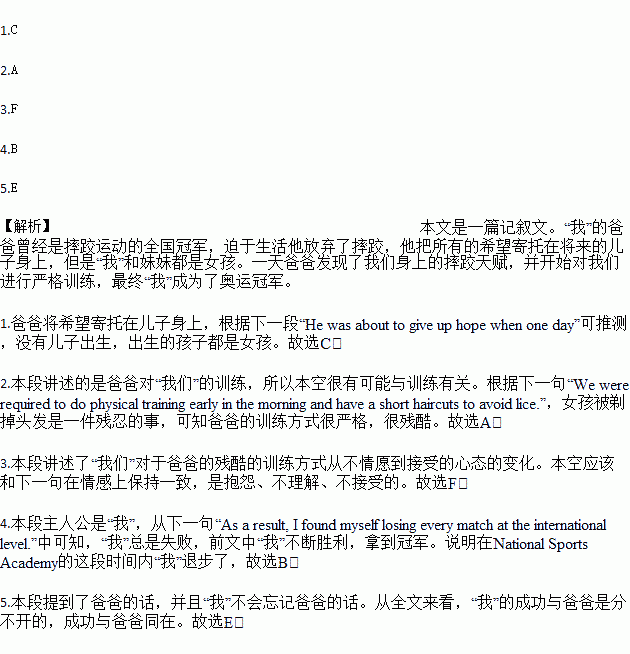题目内容
My father used to be an amateur wrestler (业余摔跤者) and national champion. He was forced by his father to give up the sport in order to obtain gainful employment, which meant he wouldn’t be able to win a medal for our country. Therefore, he made a vow that his unborn son would. 1.
He was about to give up hope when one day, my younger sister Babita and I beat up two boys accidentally in response to critical comments. My dad found our potential to become wrestlers and began coaching us. 2. We were required to do physical training early in the morning and have a short haircuts to avoid lice.
3. We would complain about him all the time. Gradually, I realized that he wanted us to have a good future and not grow up to be ordinary housewives. Motivated, we willingly participated in his coaching.
With great efforts, he made us competitive wrestlers and I won the junior and senior championships, providing me with a chance to gain training in a National Sports Academy, where pride and pain fulfilled my mind.4. As a result, I found myself losing every match at the international level. After that, I tearfully made peace with papa and turned to him for help. Then he coached me patiently.
Despite difficulty, I finally became the first Indian female wrestler to qualify for the Olympics, inspiring dozens of Indian women to take to wrestling. Even now, papa’s words are still in my mind “Geeta, think about all the girls who are thought to be inferior to boys, girls who are forced to do chores, girls who are married and have children. Not only will you compete with other countries, but also with those who look down upon women!”. I will never forget our father’s instruction. 5..
A. But his methods were cruel.
B. I almost gave up what papa had taught me.
C. Disappointingly, my mother gave birth to all girls.
D. My sister and I tried to escape.
E. I will always owe all success to him.
F. At first, my sister and I did not understand our father.
G. However, my mother didn’t agree with him.


 d or use words due to brain damage are called aphasics(失语症患者).Such patients can be extremely good at something else.From the changing expressions on speakers' faces and the tones of their voices,they can tell lies from truths.
d or use words due to brain damage are called aphasics(失语症患者).Such patients can be extremely good at something else.From the changing expressions on speakers' faces and the tones of their voices,they can tell lies from truths.